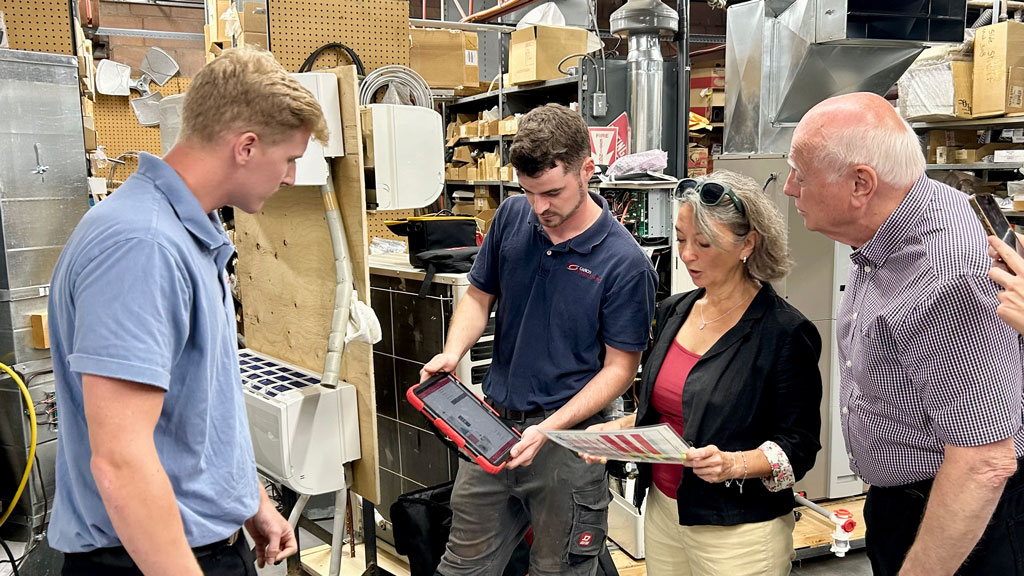It’s the HVAC sector’s time to shine as policy-makers are increasingly focused on the transition from oil furnaces to electric heat pumps as Canada moves to decarbonize.
To help ensure HVAC contractors and trades are ready to deliver, the federal government recently announced it was allocating $500,000 to the (HRAI) to support upskilling.
HRAI chair Nancy McKeraghan, principal of Canco ClimateCare, hosted the announcement at the firm’s headquarters in Newmarket, Ont.
Julie Dabrusin, parliamentary secretary to the minister of environment and climate change and to the minister of energy and natural resources, represented the federal government.
“Where are we going to get these people to install the heat pumps that we’re hoping that people are going to consider purchasing?” asked McKeraghan in an interview.
“We want to be able to assist them in terms of getting their licences, proper licences, and to give them the knowledge and the practical experience to enable them to properly install and commission them.”
Major savings from the switch
According to the federal government, as of 2023, seven per cent of Canadian homes are using electric heat pumps as their primary heating system and one in four Canadian homeowners is planning to replace primary heating systems in the next five years.
The average Canadian home that uses heating oil spends $2,000 to $5,500 on energy bills per year. Homeowners who switch from an oil furnace to a cold climate heat pump could save approximately $1,500 to $4,500 per year on their home energy bills.
In July, the federal government launched the , which introduced the $800-million Canada Greener Homes Affordability program. The program will assist low- to median-income Canadians by providing home retrofits at no cost.
The funding provided to the HRAI has several targets:
create a benchmark of skills and knowledge needed to competently install and service electric heat pumps;
identify the skills gap in the existing workforce;
work collaboratively with colleges to develop training that can be delivered in an accelerated and flexible format; and
pilot the training with a small group of gas and licensed technicians in Ontario.
The province currently has refrigeration trades workers employed primarily in the commercial sector and refrigeration workers certified to work on residential projects. In addition, some gas fitters have the required licence to work on heat pump installations but many do not.
Combined, it is estimated there will not be enough licensed trades to meet the future demand for heat pump installations.
Nationally, reported in its May 2024 paper titled Building a Greener Future that the demand for refrigeration and air conditioning mechanics created by fuel switching will increase 385 per cent between 2023 and 2034.
“This project will identify specific skills deficiencies and the education the current workforce may need to support today’s and tomorrow’s heat pump technologies,” stated HRAI vice-president of government relations Martin Luymes.
COO Ken Lancastle noted the sector has known for years there’s a shortage of refrigerant technicians across the country.
MCAC cautious about micro-credentials
Lancastle noted the MCAC has adopted a policy statement urging that the introduction of any micro-credential, such as a new skill set enabling HVAC work and heat pump installation, should augment existing trade tickets.
“That helps to maintain the standard of the trade,” Lancastle said.
“We want to ensure the skill tradespeople who are doing the work are doing it well, are doing it to a certain standard, because what we don’t want to see is the work being done substandard.”
Some MCAC members work in both residential and ICI. Lancastle noted while the recent Ontario funding announcement is primarily addressing the residential market, heat pump technology exists for larger commercial applications and industrial applications as well.
“One of the things that we’ve tried to really emphasize is just how important the mechanical contracting sector is going to be in the years ahead when comes to meeting a number of different policy objectives, whether it’s the installation of heat pumps in more places of residence across the country, whether it is in building the mechanical systems that are so important for electric vehicle manufacturing or modular reactors in nuclear power generation,” he said.
Follow the author on X/Twitter @DonWall_DCN.





Recent Comments
comments for this post are closed